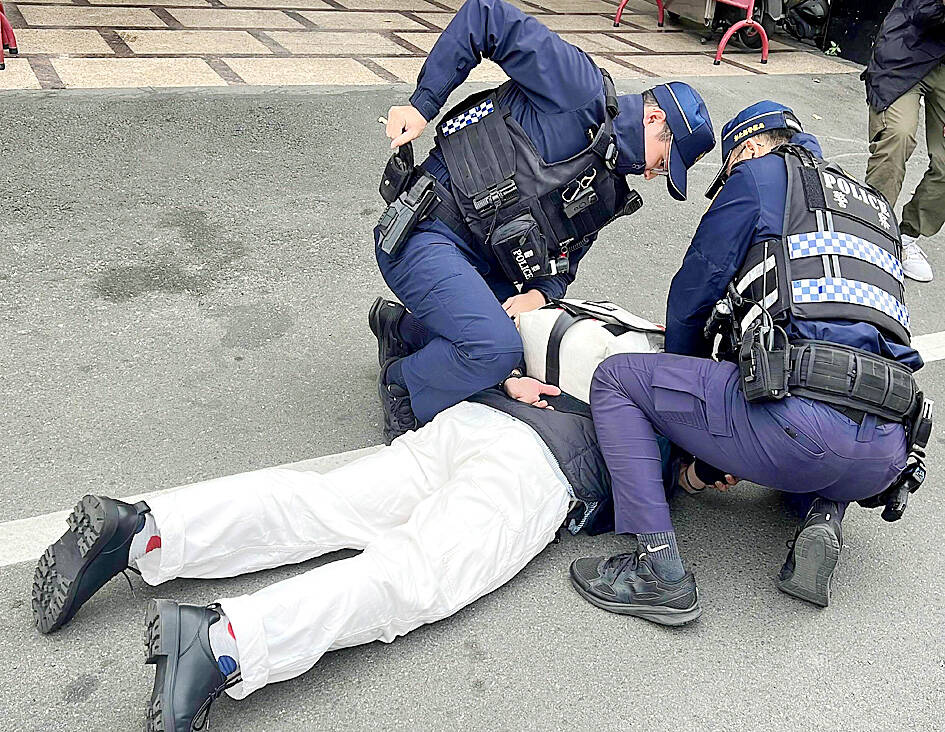Seven hundred and sixty-four foreigners were arrested last year for acting as money mules for criminals, with many entering Taiwan on a tourist visa for all-expenses-paid trips, the Criminal Investigation Bureau (CIB) said on Saturday.
Although from Jan. 1 to Dec. 26 last year, 26,478 people were arrested for working as money mules, the bureau said it was particularly concerned about those entering the country as tourists or migrant workers who help criminals and scammers pick up or transfer illegally obtained money.
In a report, officials divided the money mules into two groups, the first of which are foreigners, mainly from Malaysia or Hong Kong, coming to Taiwan on a tourist visa for quick collection jobs over several days.

Photo courtesy of the police
The second group is migrant workers who have absconded from their work contracts to work as money mules, usually receiving about NT$2,000 per assignment, the report said.
Many of the money mules who travel on tourist visas are Malaysians of Chinese descent who can speak Mandarin, a group that is often targeted for the illegal work in advertisements online, the CIB said.
The ads often promise to pay for their trip to Taiwan and arrange for their lodging, at a hotel or short-term apartment rentals, it said.
The jobs usually take seven to 10 days, and when finished, a Malaysian money mule would be paid about 10,000 ringgit (US$2,224), it said.
However, in the past few months, some people arrested for acting as money mules have come from European countries, such as Romania and Ukraine, as well as African nations, including Nigeria and Ghana, the CIB said.
Some of the foreign money mules told police they answered ads on social media offering well-paying jobs, because they were unemployed or in a dire financial situation and needed to make quick money, it said.
When they were caught, they would tell police they were just helping someone pick up money and claimed to not know they were engaging in criminal activity, it said.
The money mules are often met at an airport upon their arrival by members of a criminal operation and are closely guarded or followed around, and communicate with their employer by WeChat or Instagram, the report said.
They then pick up money at ATMs or directly from victims before departing the country after a few days, it said.
Some money mule suspects do not understand Mandarin or claim not to, or state that they are legitimately picking up money, making it difficult for local police, the CIB said.
As a result, by the time the identity of a suspect is determined and their activities exposed, it is usually too late, as they had already left Taiwan, it said.
The CIB has called for closer international cooperation to crack down on cross-border criminal activity and make checks on suspicious arrivals easier.
It has also urged for more crime-prevention ads and notices at airports and other entry points as deterrents.
Additional reporting by Jason Pan

TRAGEDY STRIKES TAIPEI: The suspect died after falling off a building after he threw smoke grenades into Taipei Main Station and went on a killing spree in Zhongshan A 27-year-old suspect allegedly threw smoke grenades in Taipei Main Station and then proceeded to Zhongshan MRT Station in a random killing spree that resulted in the death of the suspect and two other civilians, and seven injured, including one in critical condition, as of press time last night. The suspect, identified as a man surnamed Chang Wen (張文), allegedly began the attack at Taipei Main Station, the Taipei Fire Department said, adding that it received a report at 5:24pm that smoke grenades had been thrown in the station. One man in his 50s was rushed to hospital after a cardiac arrest

SAFETY FIRST: Double the number of police were deployed at the Taipei Marathon, while other cities released plans to bolster public event safety Authorities across Taiwan have stepped up security measures ahead of Christmas and New Year events, following a knife and smoke bomb attack in Taipei on Friday that left four people dead and 11 injured. In a bid to prevent potential copycat incidents, police deployments have been expanded for large gatherings, transport hubs, and other crowded public spaces, according to official statements from police and city authorities. Taipei Mayor Chiang Wan-an (蔣萬安) said the city has “comprehensively raised security readiness” in crowded areas, increased police deployments with armed officers, and intensified patrols during weekends and nighttime hours. For large-scale events, security checkpoints and explosives

A car bomb killed a senior Russian general in southern Moscow yesterday morning, the latest high-profile army figure to be blown up in a blast that came just hours after Russian and Ukrainian delegates held separate talks in Miami on a plan to end the war. Kyiv has not commented on the incident, but Russian investigators said they were probing whether the blast was “linked” to “Ukrainian special forces.” The attack was similar to other assassinations of generals and pro-war figures that have either been claimed, or are widely believed to have been orchestrated, by Ukraine. Russian Lieutenant General Fanil Sarvarov, 56, head

PUBLIC SAFETY: The premier said that security would be tightened in transport hubs, while President Lai commended the public for their bravery The government is to deploy more police, including rapid response units, in crowded public areas to ensure a swift response to any threats, President William Lai (賴清德) said yesterday after a knife attack killed three people and injured 11 in Taipei the previous day. Lai made the remarks following a briefing by the National Police Agency on the progress of the investigation, saying that the attack underscored the importance of cooperation in public security between the central and local governments. The attack unfolded in the early evening on Friday around Taipei Main Station’s M7 exit and later near the Taipei MRT’s Zhongshan